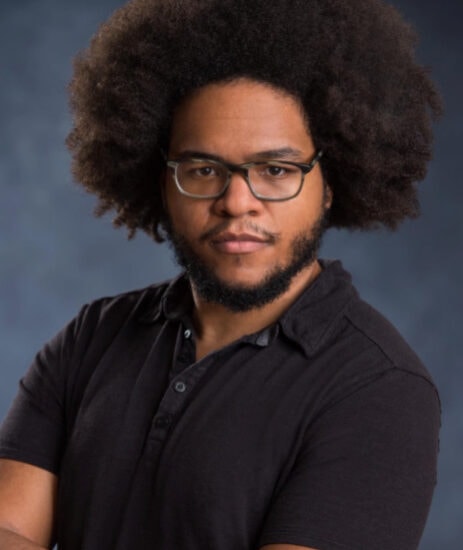
Note: this was written in early May, before police murdered George Floyd in the US and the ongoing protests everywhere. Earlier this month we published Thandiwe’s response to those more recent events, especially in terms of his home province of New Brunswick: Announcing Black Lives Matter New Brunswick: This province has a lot of catching up to do
Who defines Blackness?
That is a serious question because I really don’t know. I was raised in a white ‘colorblind’ environment that constantly downplayed the existence of my culture. As the only Black kid in my elementary school, I was educated white. So what became normal to me was accepting that my culture was the same as all the white friends, teachers, and business owners I interacted with growing up. It seemed everyone except my family in Woodstock was white and all those people I interacted with told me I was no different from them. So what makes me Black if the people in my life say it doesn’t matter?
My grandmother had nine children and growing up most of the McCarthys lived around the Woodstock area. So I had the gift of having many aunts, uncles, and cousins as best friends growing up. We joked and laughed about each other, but I don’t remember any of us specifically talking about being Black. Because I don’t have a single memory of an uncle or aunt sitting me down and saying, “Now as a young black man you know…”. From my memory we were just a Canadian family that supported our own and wanted the best for each other. I honestly believe I was raised to love myself and family. The color of our skin and history wasn’t prioritized, being strong and respectful was. So beyond how Black people were portrayed in media, I never really knew what Blackness was. Only that I looked Black and everyone white claimed it wasn’t important to acknowledge. So, I find myself asking again, what makes me Black?
What’s in a title?
I find my fears and anxiety whispering that I’m making a big deal out of nothing. But isn’t that exactly what the lone dark-skinned child in the all-white elementary school would think? Wouldn’t I be scared of finding out I’m not like the majority of people I was raised around?
My culture does matter. My culture has weight, it has a value that can be traded, increased, or diminished. It has always been a factor in everything I have done. I have had my Blackness taken away. I’ve had my Blackness viewed as the sum total of who I am and judged unfairly. Both in my favour and against.
I’ve had people enjoy my company on the phone only to totally ignore me when they met me in person, claiming I “sounded white”. I have had people never speak to me unless they were with a group of friends in public. Then they would be shouting my name and giving me weird handshakes like we were buddies. “Yeah, of course, I know him, we go way back” is what I’d hear when they walked away.
Seems some people know more about my Blackness than I do.
I’m an analytical person, so I’m goal-oriented. In this inner exploration and external reflection of culture, I find myself asking what are the goals of Blackness? To provide education, opportunities, and health for our communities? To be respected under the eyes of the law the same as other racial groups? Are the goals at the individual level the same at the community and national level? Or is there friction at each stage that causes some goals to be toxic to the community but good for the individual? And for myself, where is my unique place in this grand picture?
My entire life people pretended that my Blackness was nothing special. Only to have those same individuals describe everything I do as uniquely Black and representative of global Blackness. So I know it exists and is an important part of who I am. But what part or parts of me are Black?

My personal journey
In unpacking the complexity of my Black-self I find myself asking dozens of questions. Questions of what I present to others and how my actions are translated into the Blackness others perceive.
Alone and separate from all other humans is anyone Black? It seems what other cultures think of us does matter. Their love or hatred contributes to our narrative at multiple levels. Especially the cultures that make the laws and policies that govern us. What we think of ourselves, though reaction or reflection, seems to shift and grow the dynamic definition of what Blackness is acceptable. Respectable.
As I make my journey of personal discovery more public, I find people asking me more about my ancestry. About the people I should speak with, music I should listen to, or stores I shouldn’t buy from. I am just waking up to how complex the responsibility of being Black in Canada is. I want to celebrate my culture, but how do I do that? How do I accept my blackness? How do I channel it proudly?
Is Blackness both a motivation, goal, personality, character trait and genre of music? Type of parenting and governance? Ethical framework for knowing right and wrong? Clothing style for being strong and proud?
Is getting closer to my creative self making me Blacker? And what of this Blackness is linked to the history of the geographical area I live in? How is my unique Blackness an echo of the Black stories that have been lived through before mine?
How do I contribute to the overall narrative of Blacks in Fredericton? New Brunswick? Canada? Earth? Does each of these levels have different requirements? Are local Black heroes less black than Martin Luther King Jr? Is he less Black than the Queens of Africa who helped shape the world we know today? And is their Blackness of little consequence to what they did. Or is their Blackness the fuel they were able to draw upon that allowed them to accomplish these feats? Do I just need to be Black in order to take on the world? Or is it important that I know what being Black is, our history in order to properly use the strengths of my culture to provide for myself and those I love.
It seems I have a lot more to explore as I navigate the galaxy of strength and beauty that orbits my soul. I didn’t intend any offence with my questions. Just sharing my process and personal history. But there is one question I feel confident in answering
Am I Black?
Yes, and proud of it.
With a special thanks to our generous donors who make publication of the Nova Scotia Advocate possible.
Subscribe to the Nova Scotia Advocate weekly digest and never miss an article again. It’s free!




We can all learn much from this articulate, thoughtful, young man.
We, Black Africans Canadians and Black African Americans can define who we are.
Persons of Europeans have tried to do this for years through psychological warfare.
Many Black African Peoples have labored long and hard to be who they truly are.
What a great commentary in these troubling times. You were fortunate enough to grow up and not be challenged or treated unfairly by the others of the predominant culture. Yet unfortunate enough to see the difference in treatment by others who presented themselves as your acquaintance only when they were among friends. That was a great revelation in itself, and such a valuable learning lesson. Many blessings on your journey.